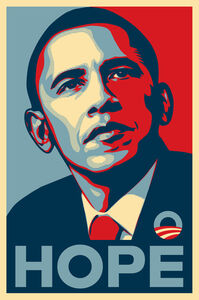More
recently, Fairey’s work has taken on a social justice tinge; for example, he created
posters of women from multiple racial and ethnic backgrounds with the caption “We
The People” to remind people of the type of inclusivity that is preached by the
declaration of independence. While once exclusive in its meaning, “all men are
created equal” has come to include people of all genders, sexualities, races,
and religions. In an increasingly polarized America, such symbols of unity have
been central in social justice movements. His use of the phrase “We The People”
transformed the images from three ethnically diverse people to citizens of
America, which changes their entire meanings and is an excellent example of
text and image.
Fairey is truly a great example of an artist who perfectly incorporates text into images in transformative ways. He is one of the few artists who can do it both ironically and seriously, and his art makes a serious impact across the world. His messages of inclusivity turn great art pieces into even greater messages. In a world where social media and trends determine self-worth, his art is an amazing way to spread ideas of social justice. Also, he continues to almost single-handedly play one of the biggest pranks ever on people with the Obey clothing line, and most people still have no idea that they are part of the joke.
Questions:
I’ve
learned that text can be used to redefine images and take the viewers’ minds to
new places. Single phrase can turn
something serious into a matter of humor, or something mundane into an
important political message. Regardless, text and image forces the viewer to
think, it casts the art in a new light, revealing something that no one has
though of before. It could also cast an antiquate topic in a new light.
Contemporary
artists use text and image most often to give something a specific meaning.
Street artists might use this ironically, while others may use to send
important messages. In today’s digital world, text and image has become an increasingly
easy thing to create: It is often used in meaningless ways, such as for humor
or certain clothing brands (supreme). As such, incorporating text in a
meaningful way has become increasingly difficult, to the point where it is most
often used to send ironic or political messages, or both.
Animation
does not allow for a lot of integration of text, however, I once made an
animation and incorporated text and image by blowing up the word divide and
replacing it with the word unite. I might also be able to use it comparatively,
by comparing to unlikely things that are actually quite similar. I may also be
able to display some sort of dystopia that reveals a gruesome truth about
reality, which would be cool.
One
thing about the investigation that specifically interested me was Phenomenology;
the idea of tricking people into trying to find a meaning is genius. The irony
of the whole situation is amazing, and it would be frighteningly easy to pull
off as teenagers today are obsessed with following trends to fit in and seem
cool. While I am not sure how I could incorporate it into my work, it is a
tempting social experiment.
Sources:
https://www.google.com/search?q=shepard+fairey+multi-ethnic+women+we+the+people&source=lnms&tbm=isch&sa=X&ved
https://www.google.com/search?q=obey+giant&source=lnms&tbm=isch&sa=X&ved=0ahUKEwivyrCR1NLdAhURON8KHXX5Ce4Q_AUIDigB&biw=1366&bih=662
https://www.google.com/search?q=shepard+fairey&source=lnms&tbm=isch&sa=X&ved=0ahUKEwjvpfaWstLdAhXNx1kKHd7sAP0Q
http://www.artnet.com/artists/shepard-fairey/
https://obeygiant.com/

Comments
Post a Comment